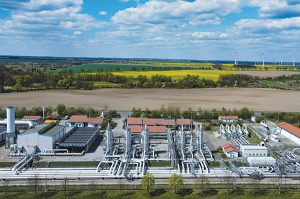Bloomberg
The euro area’s pandemic recovery would almost grind to a halt, while prices would surge even more quickly if there are serious disruptions to natural-gas supplies from Russia, according to new projections from the European Commission.
Under a severe scenario, the currency bloc’s economy would expand about 0.2% this year, with inflation topping 9%, as governments struggled to replace the imports, the EU’s executive arm said. In 2023, growth would be one percentage point below the baseline.
In its first forecasts since Russia invaded Ukraine and confirming an earlier Bloomberg report, the EU also cut its base-case outlook — predicting gross domestic product will advance 2.7% this year and 2.3% in 2023, down from February’s 4% and 2.7%. The revisions suggest Germany, the continent’s biggest economy, won’t reach pre-crisis output until the final quarter of 2022, while Spain must wait until the third quarter of 2023, the commission said.
The situation for prices is also worsening: Euro-zone inflation is seen at 6.1% and 2.7% this year and next, compared with previous projections of 3.5% and 1.7%. The peak is seen sometime this quarter.
“Russia’s invasion of Ukraine is causing untold suffering and destruction, but is also weighing on Europe’s economic recovery,†Paolo Gentiloni, the EU commissioner for the economy, said. “Other scenarios are possible under which growth may be lower and inflation higher than we are projecting today.â€
Russia war and the sanctions imposed in response have darkened the outlook for the global economy by sending energy prices surging and straining supply chains that were already reeling from the pandemic. The euro zone is among the worst-hit regions because of its reliance on Russian energy and proximity to the conflict.
The rebound from virus restrictions is now expected to be softer than initially thought
amid a worsening cost-of-living squeeze. Consumer-price growth hit a fresh record last month — reaching almost four times the European Central Bank’s 2% target.
Disruptions to Russian gas flows remain a key risk, threatening shortages that could push countries like Germany, the region’s largest economy, into recession. Chancellor Olaf Scholz has warned of a serious economic crisis in such a scenario.
 The Gulf Time Newspaper One of the finest business newspapers in the UAE brought to you by our professional writers and editors.
The Gulf Time Newspaper One of the finest business newspapers in the UAE brought to you by our professional writers and editors.
